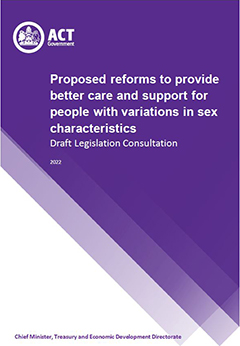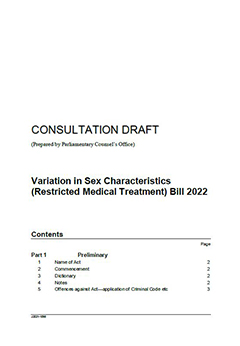Intersex people and their rights
Not everyone is born with sex characteristics that fit typical definitions for male or female bodies. People with such variations in sex characteristics are also known as intersex.
The ACT Government has legislated to protect the rights and choices of intersex people.
New law protects intersex rights
The Variation in Sex Characteristics (Restricted Medical Treatment) Act 2023 came into effect on 23 June 2023.
You can read the Chief Minister's presentation of the bill.
The new law confirms that intersex people must:
- not be harmed by inappropriate medical interventions
- be able to make their own decisions about medical treatments that affect their bodies.
This law establishes new decision-making processes for intersex people, where they are not able to make medical treatment decisions for themselves. These processes will be applied when irreversible medical treatments are being considered.
The Act will permit interventions when they meet specific criteria.
Regulation that provides detail to the bill
The law reform includes supporting legislation. You can find these here:
- Variation in Sex Characteristics (Restricted Medical Treatment) Regulation 2023
- Variation in Sex Characteristics (Restricted Medical Treatment) Assessment Criteria Guidelines 2023 (No 1)
Improvements to services
The ACT Government is also making improvements to services. It aims to increase the availability and quality of care for intersex people and their families. The government understands the importance of this for when healthcare decisions must be made.
View the frequently asked questions for more information.
Make an enquiry
Please email intersex@act.gov.au to enquire about the reforms or seek further information.
This section is about the variation in sex characteristics reform project, and contains material that reflects the historical development of the project, rather than the current legislation.
The ACT Government is reforming how treatment and support is provided to people who have variations in sex characteristics. As part of the Capital of Equality First Action Plan 2019-2021, the government is collaborating with people with variations in sex characteristics (VSC), human rights organisations and healthcare professionals to reform how treatment and support is provided to people who have VSC.
This work is based on recognition of the Darlington Consensus Statement on intersex human rights and exploring how it impacts on the ACT.
To inform the development of policy, consultation with experts and VSC community representatives across the ACT and Australia is being undertaken. This includes the health, human rights, LGBTIQ+ and legal sectors. The government is also taking into account the work of the Australian Human Rights Commission in its inquiry into protecting the human rights of people born with variations in sex characteristics in the context of medical interventions.
In December 2020, the government consulted with key stakeholders about aspects of how a prohibition could work in Canberra. You can download the Discussion Paper (PDF 548KB) to see what we asked. Fifteen submissions were received and a Listening Report (PDF 482KB) that summarises what we heard was produced.
In April 2021, the government commissioned a legal issues workshop to better understand the legal factors that may be relevant in designing a prohibition of deferrable medical interventions on intersex people. A report summarising workshop discussions, prepared by Equality Australia, is available here: Final report on legal workshop (PDF 4.5MB).
In June-July 2021, the government released a public options paper for stakeholder feedback. A Listening Report (PDF 419KB) that summarises stakeholder responses was produced.
In May-July 2022, the government asked for comments on exposure draft legislation that was proposed as part of the reform. A Listening Report that summarised stakeholder responses was produced.
In the 2022-23 Budget, the government committed $1.443 million over four years in funding:
- $30,000 over two years from 2022-23 ($20,000 in 2022-23, $10,000 in 2023-24) to fund community education and awareness campaigns.
- $1.243 million over three years from 2023-24 for the establishment and operation of the new statutory body. This includes staffing.
- $170,000 over three years from 2023-24 to boost funding for peer support services.
In addition, within the Health portfolio budget, the government allocated $1.121 million, comprising $902,000 over four years for the establishment of a Variations in Sex Characteristics (VSC) Unit and $219,000 over two years to develop training packages for health professionals to support commencement of the associated VSC legislation.
The Legislative Assembly passed the Variation in Sex Characteristics (Restricted Medical Treatment) Act 2023 in June 2023. It was notified on 23 June 2023, with most provisions taking effect on 23 December 2023.
During 2023, a draft of a regulation under the Act was circulated for discussion. You can read the draft regulation (PDF 254KB) here.
Following expert consultations, the draft was revised, with the final regulation made in December 2023.
In May-July 2022, the government released exposure draft legislation for comment align with an explanatory document.
Draft Bill and explanation
The Office of LGBTIQ+ affairs held an information session in late January 2023 on variations in sex characteristics reforms. The information session provided further details about the reform process, related initiatives and the development of legislation.
A video and summary of the information session is available for people interested in the reforms.


